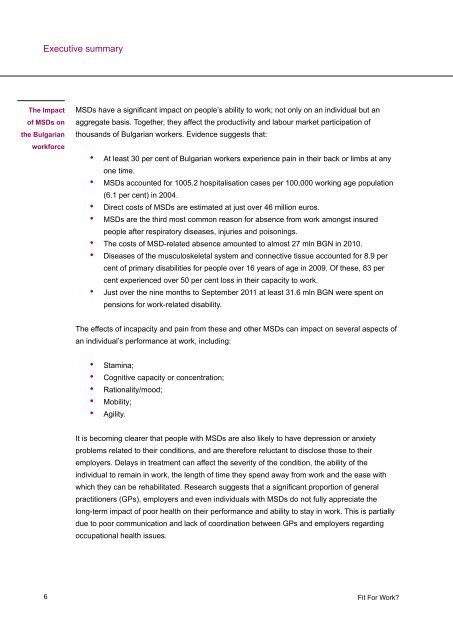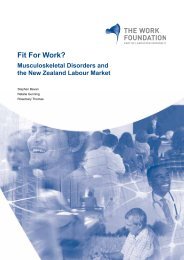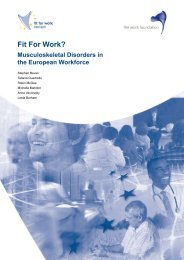FfW Bulgarian report (English language) - Fit for Work Europe
FfW Bulgarian report (English language) - Fit for Work Europe
FfW Bulgarian report (English language) - Fit for Work Europe
Create successful ePaper yourself
Turn your PDF publications into a flip-book with our unique Google optimized e-Paper software.
Executive summary<br />
The Impact<br />
of MSDs on<br />
the <strong>Bulgarian</strong><br />
work<strong>for</strong>ce<br />
6<br />
MSDs have a significant impact on people’s ability to work; not only on an individual but an<br />
aggregate basis. Together, they affect the productivity and labour market participation of<br />
thousands of <strong>Bulgarian</strong> workers. Evidence suggests that:<br />
• At least 30 per cent of <strong>Bulgarian</strong> workers experience pain in their back or limbs at any<br />
one time.<br />
• MSDs accounted <strong>for</strong> 1005.2 hospitalisation cases per 100,000 working age population<br />
(6.1 per cent) in 2004.<br />
• Direct costs of MSDs are estimated at just over 46 million euros.<br />
• MSDs are the third most common reason <strong>for</strong> absence from work amongst insured<br />
people after respiratory diseases, injuries and poisonings.<br />
• The costs of MSD-related absence amounted to almost 27 mln BGN in 2010.<br />
• Diseases of the musculoskeletal system and connective tissue accounted <strong>for</strong> 8.9 per<br />
cent of primary disabilities <strong>for</strong> people over 16 years of age in 2009. Of these, 83 per<br />
cent experienced over 50 per cent loss in their capacity to work.<br />
• Just over the nine months to September 2011 at least 31.6 mln BGN were spent on<br />
pensions <strong>for</strong> work-related disability.<br />
The effects of incapacity and pain from these and other MSDs can impact on several aspects of<br />
an individual’s per<strong>for</strong>mance at work, including:<br />
• Stamina;<br />
• Cognitive capacity or concentration;<br />
• Rationality/mood;<br />
• Mobility;<br />
• Agility.<br />
It is becoming clearer that people with MSDs are also likely to have depression or anxiety<br />
problems related to their conditions, and are there<strong>for</strong>e reluctant to disclose those to their<br />
employers. Delays in treatment can affect the severity of the condition, the ability of the<br />
individual to remain in work, the length of time they spend away from work and the ease with<br />
which they can be rehabilitated. Research suggests that a significant proportion of general<br />
practitioners (GPs), employers and even individuals with MSDs do not fully appreciate the<br />
long-term impact of poor health on their per<strong>for</strong>mance and ability to stay in work. This is partially<br />
due to poor communication and lack of coordination between GPs and employers regarding<br />
occupational health issues.<br />
<strong>Fit</strong> For <strong>Work</strong>?







